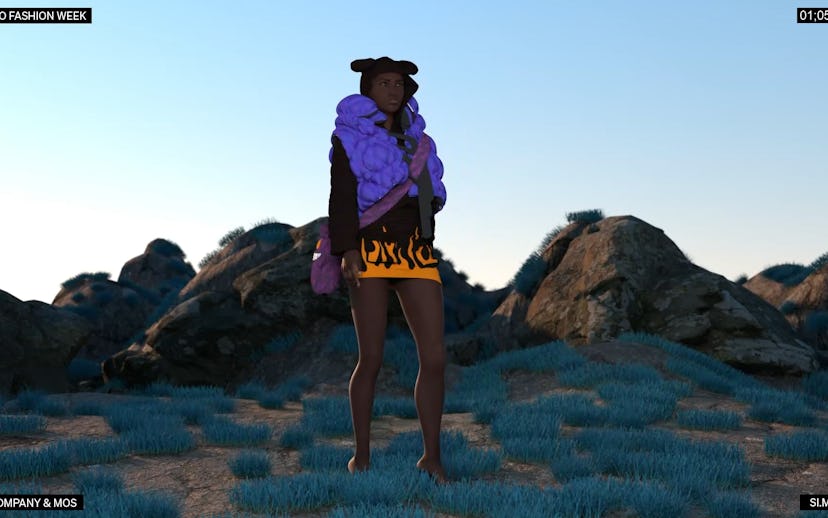
Fashion
Inside Crypto Fashion Week, The Future Of Digital Fashion
A week-long exploration of blockchain-powered digital fashion.
In the past few years, digital fashion has made its way from the gaming world to the mainstream fashion industry. Virtual collections, avatar influencers, and more are becoming less of a one-off gimmick and, instead, part of a larger conversation on how we consume fashion in an increasingly digitized world. The emphasis then becomes on making it possible for digital designers not only to receive proper credit but also to be fairly compensated. This, says the organizers of the first-ever Crypto Fashion Week, which debuted at the end of February, is where blockchain technologies come in.
Cryptofashion is digital fashion that can be traded and authenticated upon the blockchain (a data structure that holds transactional records and ensures security and decentralization). As fashion month went mostly online, Crypto Fashion Week came to fruition at a time when the pandemic has secured digital fashion’s relevance and cryptocurrencies are becoming mainstream (with Elon Musk recently changing his Twitter bio to #bitcoin). The result was a packed online schedule filled with workshops, exhibitions, and conversations across Clubhouse, Twitch, YouTube, and the metaverse, bringing together a community of designers, artists, technologists, and anyone with an interest in digital fashion. There was also a special appearance by Kuki, a transhuman AI-powered by ICONIQ, who spoke about digital fashion for the first time.
“The idea of Crypto Fashion Week was born as a way to capture the larger conversation on the shift of consciousness and identity,” Lady Phe0nix, co-organizer of Crypto Fashion Week and co-founder of crypto art consultancy Universe Contemporary, tells NYLON. Creating a “phenomenal” amount of interest from those new to the space, Lady Phe0nix hopes Crypto Fashion Week and future events can create a collaborative space for the emerging sector of digital fashion.
While digital fashion is becoming more ingrained in everyday industry lingo, partnering this with cryptocurrency is out of the scope of knowledge for many. The collision of these technologies, however, will be crucial to the future of digital fashion and creators. “I think something that really is important when we're working in the digital space is to be able to bring value back to the traders. Not having that link makes it a lot harder,” says Dylan Tull, co-organizer of Crypto Fashion Week and founder of Non.Company.
Beyond ensuring that the digital designers are compensated, blockchain technology also provides a solution to crediting issues, Tull explains. “I think that as the metaverse and the digital fashion worlds grows, there's going to be layers of collaborations and evolution of pieces and it will be really important to be able to trace back that value to the original creator.” As many BIPOC designers in the physical fashion space continue to have designs stolen by fast-fashion companies, it seems cryptofashion poses an online solution.
When speaking of a future that involves purchasing digital garments, it’s hard not to give it a backdrop of a far-off future. This is something Lady Phe0nix doesn’t think will be the case. “Digital fashion might overtake physical sales sooner than we think. Especially now, during COVID, people aren’t really dressing to impress anywhere but the internet,” she explains. “If you think about the ways that digital fashion can phase out production costs, save manufacturing costs, save landfill costs, and then if I'm wearing it just to show off on social to my friends or to show up in a video game, then it may as well be something digital because these environments are digital environments.”
Alongside environmental benefits that the overconsumption of the fashion industry desperately needs, Lady Phe0nix says digital clothing provides a layer of accessibility and more opportunities for personal expression by “breaking out of the box of physicality,” referencing clothes that change color based on your mood. This, in tandem with apps like Snapchat revealing 3D full-body tracking for AR lenses, will make digital clothing more widely adopted. Then there’s also the opportunity for physical and digital clothing to meet, something with which many brands have already begun experimenting.
For 3D designers in the field like Stephy Fung, based in London, more awareness of these technologies also calls for more diverse talent. “Currently, the majority of crypto artists are white-male dominant and that is reflective of the 3D industry,” she tells NYLON. “We need to encourage younger generations to learn these digital skills so that the industry can diversify and also have more different types of designs to show.” Fung’s work usually encompasses Chinese culture, including the piece she showcased at Crypto Fashion Week, “Empress' Stroll.”
Fung says the beauty of digital clothing is the ability to tell a greater narrative. “You can set a scene and art-direct the atmosphere the garment is meant to live in,” she says. “Combining it with blockchain is a great idea because digital work can now be sold using digital currency and can be maintained to be seen as a digital output rather than selling digital work as a still print, which by no means does digital work justice.” She hopes technology will be more accessible and streamlined to bring digital clothing further into mainstream discussions in the fashion industry.
With more crypto fashion events in the works for the near future from the Crypto Fashion Week team, it’s clear not only digital fashion but blockchain technologies are set to soon become part of the daily dialogue in the fashion world. Considering the current waste problem in the industry, the shift towards AR and VR, and the opportunities to create a more inclusionary and creative industry, it’s something that should be embraced. As Fung puts it: “There are already enough physical clothes in the world, so why not try wearing digital fashion instead?”